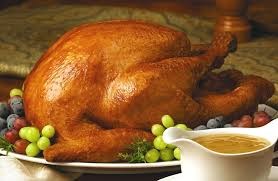Experts with the BC Centre for Disease Control (BCCDC) are reminding all home chefs to thoroughly cook their turkey this Thanksgiving weekend and throughout the upcoming holiday season. There is an outbreak of since 2017 linked to raw turkey and chicken – including 26 cases in B.C. Â
“Not properly cooking poultry increases the risk of illness for those who handle or eat it,” says Marsha Taylor, epidemiologist, BCCDC. “Salmonellosis is serious and it can ruin any Thanksgiving dinner, so remember to fully cook your turkey dinner and use a meat thermometer to ensure it is safe to eat.”
Turkey should be cooked to an internal temperature of 74 Celsius or hotter to prevent sickness caused by Salmonella, a type of bacteria often found in poultry products, including chickens, eggs and turkey. Use a probe tip food thermometer to check the bird’s internal temperature by inserting it into the breast or the inner thigh.
“It is important to remember raw juices from poultry can easily spread to surfaces from the sink if the meat is rinsed,” said Lorraine McIntyre, food safety specialist, BCCDC. “Instead of rinsing, pat the turkey dry with paper towels and then discard the towels into the compost to help prevent cross contamination.”
Quick Facts:
- Salmonellosis causes symptoms including diarrhea, fever, and abdominal cramps that develop 12 to 72 hours after infection and usually lasts four to seven days.
- Salmonellaare a common cause of diarrhea in B.C. and around the world. Children four years old and younger have the highest infection rates in B.C. Â
- Wash your hands and cooking surfaces with hot, soapy water before and after preparing food. It is especially important to wash down surfaces after preparing raw meat.
- Keep raw meat separated from other foods and stored in the bottom of your refrigerator until it’s time to use. Ensure raw turkey and chicken juices don’t drip down onto other foods. Thaw frozen poultry products in the fridge or in cold water prior to cooking.
- Never rinse raw poultry before cooking because it can spread bacteria wherever the water splashes.
- If you decide to brine your turkey ensure the brine is cold before immersing your turkey and keep the brine and the turkey in the refrigerator until it’s time to cook.
- Always cook turkey and chicken products to a safe internal temperature of 74 Celsius or hotter to kill any harmful bacteria.
- To check, insert the probe tip thermometer into the meatiest part of the bird, either a couple of inches into the breast or the inner thigh, near the breast.
- Cook stuffing separately in a casserole dish or if you decide to cook your stuffing inside the turkey, stuff the bird just before cooking and use a food thermometer to make sure the stuffing’s centre also reaches 74 Celsius or hotter.
- After the meal is over, put leftovers into the refrigerator within two hours. Foods should not be left out longer than four hours, otherwise spore forming bacteria may regrow and release toxins into the food. Eat leftovers within two to three days or freeze them for later use.Â
- If you feel unwell, and especially if you have symptoms like diarrhea or vomiting, do not cook or prepare food for other people.
Learn More:
- Check out the  to learn more.
- For answers to commonly asked questions on cooking turkey please visit link.
To see BCCDC’s Foodborne Outbreaks Inforgraphic click .



